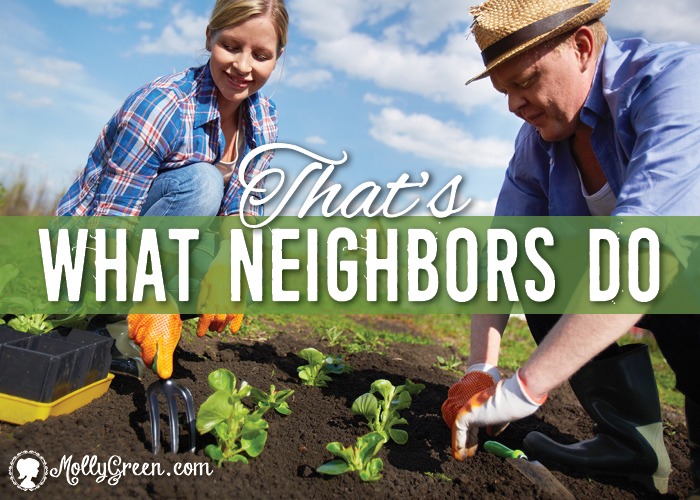By Kristi Cook
Self-sufficient living is not for the faint of heart—as many before me have noted in their own writings. Mastering the skills required on a homestead brings an inherent learning curve as well-intentioned plans fail at least a time or two during the learning process. Yet, for my husband and me, one of the hardest skills we’ve had to master is letting others help us without an exchange of money or indebtedness; that is, what neighbors helping neighbors really means. My husband and I began our homestead-building with the misunderstanding that it would be completely self-sufficient living and that we should be able to do all things ourselves with only a bit of help from family. We’d never anticipated the need to ask neighbors to borrow equipment or assist with a big job. True to our self-reliant personalities, we didn’t want to be indebted to others.
It Started With A Homesteader’s Admiration
Enter Wade and Lee. I had attended Wednesday night study group with Lee for a couple of years and we’d even bought hay from her husband, Wade. However, we hadn’t really become any more than acquaintances during that time. One day, while I worked with Lee on our church’s food pantry and clothes closet, I discovered that Wade knew how to buy and raise livestock, butcher it humanely, and process it himself. However, he didn’t do this for others as a business, limiting himself to his own family due to USDA restrictions. Despite these limitations, I became determined to find a way to glean his knowledge and maybe even snag a pork chop or two.
Becoming Good Friends
Over time, the four of us became good friends as Wade patiently answered my unending questions regarding his own methods and beliefs. Very rarely have I ever met an individual so patient with my relentless questioning. Wade and Lee even agreed to let us tag along when they went to purchase hogs at the beginning of that year’s butchering season.
Eventually, we became brave enough to make our first animal purchase and promptly began following Wade’s old-time knowledge—knowledge that he’d learned from his parents and grandparents during their hogs-and-butchering days. He taught us how to not only humanely kill a hog, but how to process it, as well. We soaked in as much knowledge as possible on all things hog-related.
We Felt Deeply Indebted
Yet, Wade and Lee never allowed us to pay them in any way. Believe me, we tried. Many times. They claimed that the help we give them when they processed their own hogs was payment enough (despite the fact that our so-called “help” really seemed to slow them down). Unfortunately, the lack of monetary compensation caused my husband and me to feel deeply indebted to them, despite our growing friendship.
What we didn’t realize is that there comes a point in a relationship with friends and neighbors when offering money becomes an insult. The skill of gracefully accepting help from friends with no strings attached is a skill we had to learn the hard way.
Not The Kind Of Self-Sufficient Living We Expected
Like most homesteads, we have more work that needs doing than time. Because of this, we found ourselves with a barn full of horse manure and no compost, yet the gardens needed fertilizer to ensure good crops. And while we do have a tractor, we don’t have a front end loader to move that much manure from the back pasture to the front gardens. We had to ask someone for help.
As with our desperate cravings for meat, Wade came to our rescue yet again. One early Saturday morning he drove his front end loader the short distance from their home to ours to move the seemingly endless pile of manure for us. A job that would have taken us the entire summer to do by shovel and trailer, he completed in under three hours. We were so very grateful!
Greeted By An Unhappy Friend
Not knowing how to show our gratitude, I bagged up a couple of jars of homemade jelly that I knew Wade liked along with a thank you card and some cash, then sent my daughter out to meet Wade and her dad with the bag of goodies. Little did I know that my husband had already offered him the same amount of money to pay for his time and fuel. (I’d like to say great minds think alike, but in this case, I don’t think that would be true!) Wade promptly got upset, explaining that it’s simply neighbors helping neighbors and don’t offer money. When I heard of Wade’s reaction, I kind of laughed, shook my head, and went about my day.
Honestly, I didn’t think any more about it until the next morning at church. At the end of services, I tried to catch Wade before he headed out the door, only to miss him. I then went to the nursery to say hi to Lee and to let her know how much we appreciated his help the day before. Much to my surprise, I was greeted by an unhappy friend. Looking me square in the eye, Lee scolded, “If you ever offer him money again for helping you, he will never help you again.”
We Help People Because That’s What Neighbors Do
Taken aback, I gave a weak smile, not sure what to think. “It was in a gift bag with a card! You can’t give a gift back,” I said. I had thought a gift bag was a good idea the day before, now I wasn’t so sure.
“I mean it, Kristi,” she said, shaking her head. “He won’t help again if you keep trying to give him money.” My eyes started to tear up, as I realized my dear friend was serious and not simply making the polite little comments people often make when trying to appear humble when offered money.
“I’m sorry, Lee. I didn’t mean to offend you two. We’re just not used to people doing things like that and not expecting something in return.” It was all I could think to say as I stood in the nursery doorway, trying not embarrass myself with more tears. “I don’t care what other people do,” she explained. “We help people because that’s what neighbors do.”
Self-Sufficient Living Still Includes Kindness
It was in that moment that I understood what neighbors helping neighbors meant and also the meaning of friendship. Friends depend on each other and help each other when various needs arise. Wade and Lee have taught us, though the words may have seemed harsh at the time, that true friends don’t offer money for kindness and, more importantly, true friends don’t keep score, waiting for the moment to “collect” or “pay back.” And that’s a good thing for us, as we will never in our lifetime be able to repay our dear friends for all the help, knowledge, and love they have given us. They are truly a God-given blessing.
Teach Our Children To Help Others In Need
I say all of this to help others who are starting down the path of self-sufficient living avoid the learning curve so many of us experience when we first encounter those rare, real friendships. In today’s society, we have all been conditioned to believe that if someone does something for us, we “owe” them and must drop whatever we are doing when they call in a favor. Unfortunately, I often see that both sides live by this creed. Yet, if we teach our children that real friendships follow the example of the Good Samaritan, that is, helping others when they are in need, knowing that person may never be able to repay you, we can rest assured that our children will be lights unto this world, showing Christ’s sacrifice and unselfish love just as Wade and Lee showed us.
Kristi Cook’s family has been discovering the joys of sustainable and self-sufficient living for many years. One of Kristi’s greatest pleasures is sharing lessons learned along the way with others. Contact her at [email protected].





